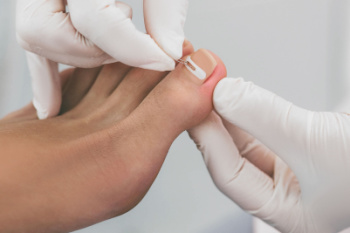
Dr. Kenneth Rosenthal
Dr. Jonathan C. O’Quinn
Dr. Michael J. Price

Dr. Kenneth Rosenthal
Dr. Jonathan C. O’Quinn
Dr. Michael J. Price

Chronic ingrown toenails can be a persistent and painful foot condition. They occur when the edge of the toenail, usually on the big toe, grows into the surrounding skin, leading to discomfort, swelling, redness, and sometimes infection. While an occasional ingrown toenail is common and often manageable at home, chronic ingrown toenails are a recurring problem. Several factors can contribute to chronic ingrown toenails, including improper nail trimming, wearing tight or ill-fitting shoes, genetics, and underlying foot deformities. Over time, chronic ingrown toenails can lead to pain and discomfort, making it difficult to walk and wear shoes comfortably. Treatment options for chronic ingrown toenails may include gently lifting the ingrown edge of the nail and placing cotton or dental floss under the nail to encourage it to grow away from the skin. In more severe cases, a podiatrist may need to trim or remove the ingrown portion of the nail, and in some instances, surgery may be necessary to permanently correct the problem. If you have ingrown toenails and you are experiencing pain or if it is a repeated issue, it is suggested that you schedule an appointment with a podiatrist for treatment and proper management of this condition.
Ingrown toenails may initially present themselves as a minor discomfort, but they may progress into an infection in the skin without proper treatment. For more information about ingrown toenails, contact one of our podiatrists of Eastern Carolina Foot & Ankle Specialists. Our doctors can provide the care you need to keep you pain-free and on your feet.
Ingrown Toenails
Ingrown toenails are caused when the corner or side of a toenail grows into the soft flesh surrounding it. They often result in redness, swelling, pain, and in some cases, infection. This condition typically affects the big toe and may recur if it is not treated properly.
Causes
You are more likely to develop an ingrown toenail if you are obese, have diabetes, arthritis, or have any fungal infection in your nails. Additionally, people who have foot or toe deformities are at a higher risk of developing an ingrown toenail.
Symptoms
Some symptoms of ingrown toenails are redness, swelling, and pain. In rare cases, there may be a yellowish drainage coming from the nail.
Treatment
Ignoring an ingrown toenail can have serious complications. Infections of the nail border can progress to a deeper soft-tissue infection, which can then turn into a bone infection. You should always speak with your podiatrist if you suspect you have an ingrown toenail, especially if you have diabetes or poor circulation.
If you have any questions, please feel free to contact our office located in Greenville, NC . We offer the newest diagnostic and treatment technologies for all your foot care needs.